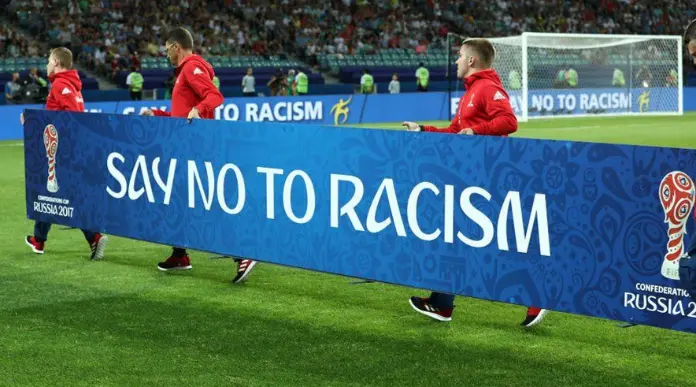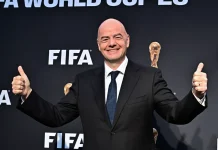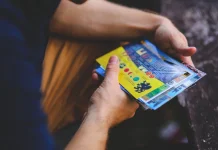FIFA, the global governing body of football, remains under intense scrutiny for its response to racial abuse in the sport. While FIFA has implemented anti-racism protocols and pledged stronger penalties, critics argue that these steps are mostly symbolic and lack effective enforcement. From Europe to South America, racism continues to taint the beautiful game, and FIFA’s inability to deliver real accountability undermines its credibility.
This article analyzes FIFA’s current anti-racism strategies, their enforcement, and the widespread call from players, federations, and advocacy groups for deeper structural reforms.
FIFA’s Recent Anti-Racism Policies: Symbolism Over Substance?
The “No Racism Gesture” and Disciplinary Code Updates
In May 2024, FIFA launched a new symbolic action—a crossed-arm “X” gesture—allowing players and referees to signal racist abuse during matches. The move, ratified by all 211 FIFA member associations, was paired with amendments to the FIFA Disciplinary Code (FDC). These changes included:
- A mandatory Three-Step Procedure:
- Stop the match when racist abuse occurs.
- Suspend the match if abuse continues.
- Abandon the match as a last resort.
- An increase in the maximum fine for racist incidents to CHF 5 million (approx. $5.9 million).
- Empowerment of players and referees to identify perpetrators for stadium removal.
- FIFA’s right to intervene or appeal cases when local associations fail to act.
These formal actions marked a shift in tone, with FIFA President Gianni Infantino pushing for automatic match forfeits and urging governments to criminalize racist behavior at stadiums.
The Gap Between Rhetoric and Reality
Despite these initiatives, critics point to a striking disconnect between policy and actual enforcement.
Three-Step Rule Rarely Enforced
Although codified in FIFA rules, the Three-Step Procedure is rarely used to its full extent. Most matches marred by racist abuse continue without interruption. In practice, the burden often falls on players to initiate the process by performing the “X” gesture—putting the responsibility on victims rather than institutions.
Weak Penalties for Clubs
Disciplinary outcomes rarely match the severity of racist incidents:
- In January 2024, Udinese fans racially abused AC Milan goalkeeper Mike Maignan. The result? A partial stadium closure and minor fan bans—no forfeits or significant club sanctions.
- In 2023, Juventus faced a similar outcome after fans abused Romelu Lukaku—a one-match partial stadium closure with no long-term repercussions.
These penalties are often deemed insufficient deterrents, especially for repeat offenders.
Lack of Transparency and Action
FIFA’s ability to override inadequate sanctions by national federations is rarely exercised. Advocacy groups like Kick It Out and FARE (Football Against Racism in Europe) argue that FIFA’s disciplinary proceedings lack transparency and consistency, leading to widespread impunity.
Global Backlash and Calls for Accountability
Players and Advocacy Groups Speak Out
- Gianni Infantino reiterated support for automatic match forfeits and urged FIFA members to align local regulations with international expectations.
- FARE Executive Director Piara Powar criticized FIFA’s enforcement as “the easiest thing possible,” noting that perpetrators often go unpunished and return emboldened.
- Kick It Out stressed that players should not bear the burden of halting games or protesting abuse—responsibility must lie with governing bodies.
- Fatma Samoura, FIFA’s former Secretary General, labeled racism as her “last battle,” acknowledging that symbolic gestures are not enough to resolve the deeply rooted issue.
Case Study: South America’s Racism Struggles
The Palmeiras Under-20 Incident
In February 2024, Palmeiras striker Luighi was subjected to monkey chants during a CONMEBOL Libertadores Under-20 match. Despite video evidence and public outrage, the opposing club Cerro Porteno was fined only $50,000 and given minor fan bans. The Brazil Football Federation and Palmeiras condemned the penalty as “derisory” and demanded reforms.
Systemic Issues
FARE reported 676 racist incidents in CONMEBOL competitions from 2014 to 2024. With limited enforcement and mild penalties, South American football remains a hotspot for racial abuse, prompting Brazilian clubs to petition FIFA for:
- Mandatory minimum fines.
- Transparent enforcement protocols.
- Stricter punishment for repeat offenders.
FIFA’s 2025 Code Amendments: A New Dawn or More of the Same?
In May 2025, the FIFA Council introduced stricter regulations to enhance accountability:
- The Three-Step Procedure is now universally mandatory via Article 15 of the FDC.
- Maximum fines increased to CHF 5 million.
- Players and officials empowered to help identify offenders.
- FIFA can appeal to the Court of Arbitration for Sport if local bodies fail to act.
- Member associations must align with FIFA’s anti-racism framework.
While these rules represent a legal and structural evolution, enforcement remains the critical challenge.
The Road Ahead: Bridging the Gap Between Policy and Practice
Enforcement Still Lags
FIFA’s framework is only as effective as its enforcement. Given the autonomy of national associations, inconsistencies persist in applying sanctions, particularly in leagues with less oversight or political will.
Education and Cultural Change
Symbolic penalties and fines won’t end racism alone. FIFA’s Football for Schools initiative, which integrates anti-racism lessons, is a positive move—but broader educational efforts are required across clubs, fans, and youth programs.
Legal Support and Criminalization
Infantino’s push for criminal penalties for racist abuse in stadiums is crucial. Legislative cooperation would signal zero tolerance and move anti-racism enforcement beyond football bodies to national governments.
Symbolism Must Give Way to Action
While FIFA has taken steps to confront racism—introducing new gestures, procedures, and fines—the core problem persists due to weak enforcement, inadequate penalties, and inconsistent application by national bodies. The disconnect between lofty rhetoric and ground-level realities fuels continued abuse and erodes trust in FIFA’s commitment to equality.
Calls for automatic match forfeits, minimum fines, transparent investigations, and criminal prosecutions reflect a growing demand for real consequences. Until FIFA closes the gap between policy and practice, its anti-racism efforts risk being remembered not as a turning point, but as yet another chapter of unfulfilled promises in global football.













